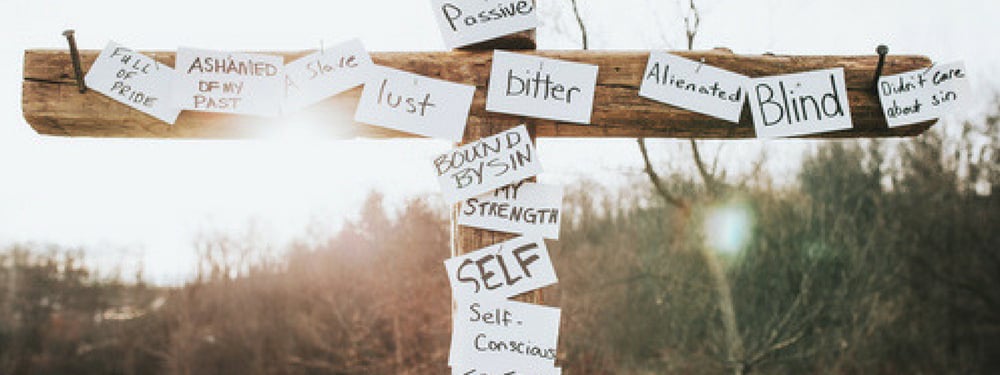When we sit in the dirt feeling the effects of our shame and guilt, sometimes we wrongfully feel that our sin is bigger than our Savior. We sometimes become afraid that the accusation is too awful and there’s no coming back from our spot in the dirt. It is then, that our Savior stoops down into the dirt and lifts us out of our shame and guilt. It was for this very purpose that He came.
Jesus and the Woman Caught in Adultery
It is dawn, and the Man everyone has been talking about has come again to teach at the temple. As the people around Him eagerly hang on to His words of truth, they see a disturbance in the crowd around them. They see a parade of decorated religious leaders, heads held high, making their way toward Jesus. In their band, a disheveled woman with flushed cheeks hidden behind unkempt hair can be spotted. As they approach Jesus, the men pompously throw this humiliated woman at his feet. They then inform Jesus that this woman has been caught in adultery and they remind Jesus that the Law of Moses commands she be stoned.
They cunningly ask Jesus, “what do you say?” Silence. All who are around hold their breath as their eyes look to Jesus in anticipation of his response. They then all watch Jesus calmly and deliberately stoop down to the same dirt in which the woman is cowering. He starts writing with his finger in the dirt. As they press him again for a response, he says, “Let him who is without sin among you be the first to throw a stone at her.” After speaking these words, He continues writing in the dirt. One by one, the crowd dissolves among them, until it is just Jesus and the woman together in the dirt. Jesus compassionately asks the woman, “Where are they? Who is here to accuse you?” She answers, “No one, Lord.” Jesus responds, “Neither do I. Go now, and sin no more.” (paraphrased from John 8:1–11)
Like this woman from John 8, we have all shamefully cowered in the dirt surrounded by the accusations, guilt, and shame of our sin. All sin condemns us. Romans 3:10 says, “as it is written: ‘None is righteous, no, not one.’ ” And James 2:10 says, “For whoever keeps the whole law but fails in one point has become guilty of all of it.” As we can see in God’s Word, all sin condemns us. It is not that one sin is greater than another. The eternal consequences of sin are the same. The earthly consequences, however, tend to discriminate. There are some sinful thoughts and actions that Satan uses to send us into the dirt of shame and guilt.
Guilt Over Specific Sins
What specific sin has sent you recoiling into the dirt before your Lord?
- Do you sit in the dirt of the shame and guilt of the premarital sex you rationalized for so long?
- Do you sit in the dirt of the shame and guilt of being a slave to alcohol?
- Do you sit in the dirt of the shame and guilt of the temper you continue to lose with your own growing children?
- Do you sit in the dirt of the shame and guilt of the hold your gambling addiction has on you?
- Do you sit in the dirt of the shame and guilt of the pornography from which you can’t turn away?
- Do you sit in the dirt of the shame and guilt of the abortion you chose that is now tearing your heart apart?
- Do you sit in the dirt of the shame and guilt of the gossip you indulge in to avoid your own shortcomings?
- Do you sit in the dirt of the shame and guilt of the adultery you’ve committed out of boredom of your own marriage?
The Savior from Shame
When you question if even this sin can be forgiven, joyfully read the words of Isaiah 61:1–4. As you read them, imagine your Savior meeting you in the dirt and lifting you out of your shame and guilt.
“The Spirit of the Lord God is upon me,
because the Lord has anointed me
to bring good news to the poor;
he has sent me to bind up the brokenhearted,
to proclaim liberty to the captives,
and the opening of the prison to those who are bound;
to proclaim the year of the Lord's favor,
and the day of vengeance of our God;
to comfort all who mourn;
to grant to those who mourn in Zion—
to give them a beautiful headdress instead of ashes,
the oil of gladness instead of mourning,
the garment of praise instead of a faint spirit;
that they may be called oaks of righteousness,
the planting of the Lord, that he may be glorified.
They shall build up the ancient ruins;
they shall raise up the former devastations;
they shall repair the ruined cities,
the devastations of many generations.”
Read more about the blessings of forgiveness in Flowing from the Cross by Dan Paavola.













